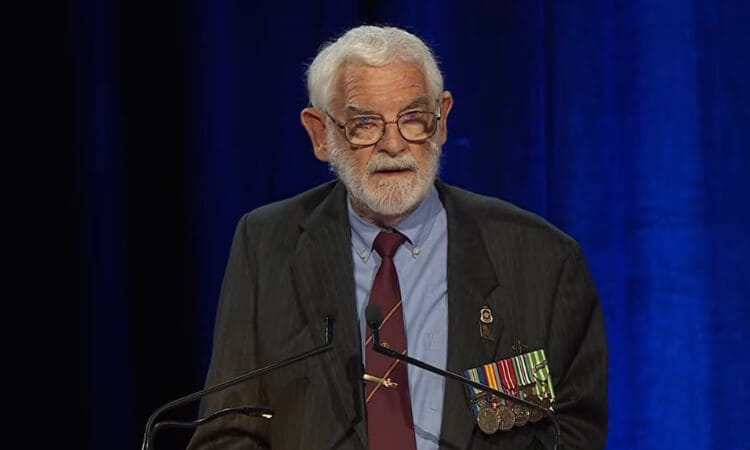With Mother’s Day around the corner, you may be wondering what gift you’ll give mum – or any of the mums in your life. This year, why not skip the fancy dinner and offer one of the most precious gifts there is: quality time, in front of the TV.
When I asked seven experts what movies they’d recommend for Mother’s Day, I wasn’t expecting I, Tonya or Alien: Romulus – but their responses have made me realise just how multifaceted the experience of motherhood is, and how weirdly and wonderfully it can be reflected onscreen.
So here’s what to watch if you want to laugh, cry, or scream, in an ode to mothers everywhere.
I, Tonya (2017)
The first film from Margot Robbie’s production company LuckyChap Entertainment – which earned Robbie an Oscar nomination for best actress – is an ideal viewing choice for anyone wanting to support Aussie female talent.
Former American figure skater Tonya Harding became a household name in 1994, after her then-husband Jeff Gillooly orchestrated an assault on her primary rival, Nancy Kerrigan, in a bid to block Kerrigan from representing the United States at that year’s Winter Olympics.
I, Tonya presents the event, and those of Harding’s career leading up to it, from a more sympathetic perspective than usual. Although it is careful to open with the caveat that the story is derived from “irony-free, wildly contradictory, totally true interviews with Tonya Harding and Jeff Gillooly”, the film presents Harding’s life as one of abuse and cruelty at every turn.
The judges can’t stand her “unfeminine” power. Her husband only shows love through violence. And her heartless mother, LaVona (Alison Janney) is desperate to cash-in on the financial gains from her career success, while simultaneously resenting it.
Janney’s performance as LaVona won her the Academy Award for best supporting actress, a title thoroughly deserved as an ice-cold LaVona chainsmokes through barbed criticisms and physical threats. While I, Tonya may not be the most obvious choice for a film to watch on Mother’s Day, it certainly will make you appreciate yours.
– Jessica Gildersleeve
Stepmom (1998)
Stepmom, starring Julia Roberts and Susan Sarandon, is a family weepy for anyone who needs a cathartic cry. Directed by Chris Columbus, the comedy–drama follows the story of terminally ill woman Jackie Harrison (Sarandon) as she comes to grips with the fact her ex-husband’s new girlfriend Isabel (Roberts) will soon be her children’s stepmother.
The film, like others under Columbus’ direction, is a critique of domestic dysfunction (think Home Alone, Mrs Doubtfire, or Nine Months), and an exploration of the lengths characters will go in order to restore the ruptured (nuclear) family, whether literally or symbolically.
Despite its melodramatic machinery and predictable ending, Stepmom offers a nuanced portrayal of the struggles of children during separation or divorce. We see 12-year-old Anna and her little brother, Ben, an aspiring magician, caught in an emotional tug-of-war between their loyalty to their dying mother and their natural affection for their new stepmum.
In an honest moment, an anxious Ben asks his dad, “can you ever fall out of love with your kids?”
“No, that’s impossible,” Dad responds.
In an equally realistic thread, the sullen Anna begrudgingly turns to Isabel for advice on boys, clothes and makeup – their relationship soon resembling one of sisters rather than adversaries (controversially, Roberts’ character even takes it upon herself to explain the concept of “snowblowing” to the tween).
In 1998, Stepmom was ahead of its time – not in its representation of motherhood, but in its acknowledgement the nuclear family was, even back then, a thing of the past.
– Kate Cantrell
Double Jeopardy (1999)
Like most thrillers made in the 1990s, Double Jeopardy begins in the Pacific Northwest region of the United States: the epicentre for murder and mist.
Libby Parsons (Ashley Judd) is living the idyllic waterfront life with her husband Nick (Bruce Greenwood) and son Matty. After being convinced by Nick to go yachting, Libby wakes up on the boat (during what could best be described as a mist storm) to discover Nick is missing, and there is an endless path of blood from her hands to the yacht’s edge.
Libby is tried and convicted for Nick’s murder. While grieving her son in jail, she finds out her husband is actually alive and has framed her. Libby’s cellmate tells her about the “double jeopardy” rule: you can’t be tried for the same crime twice.
The montage of Libby preparing for revenge in jail signals an uptick in campy action. Upon her release, we’re introduced to parole officer Travis (Tommy Lee Jones). A game of cat and mouse ensues that is equal parts thrilling and ridiculous.
Ultimately, Libby must choose between vengeance and getting her son back. Will she follow the rules and wait, or will she put her relentless jail workouts to good use? Double Jeopardy is profoundly stupid and fun, with all the unexpected charm of a midday movie that pulls you in, despite not making much sense.
It’s just the kind of movie my mum and I have found ourselves glued to on a Saturday afternoon – cheerleaders for revenge.
– Kathleen Williams
Monster-in-Law (2005)
What lengths would you go to protect your son from marrying someone unsuitable? One of the first references to the roles of the mother-in-law can be traced back to Latin literature, and the comedic play Hecyra, by Roman playwright Terence, which was first successfully performed in 160 BC. The play’s comedic twist is that the mother-in-law is accused of hating her son’s wife.
The 2005 box office hit Monster-in-Law (2005) follows this trajectory and takes it to the extreme. Viola Fields (Jane Fonda) becomes manipulative and acts downright dirty to prevent her son, Kevin (Michael Vartan), from getting married to his fiancée Charlie (Jennifer Lopez) – who she thinks is not good enough for him.
This romantic comedy has the conventions of love, romance, a wedding, and overall impending chaos. It is about a mother trying to do what she thinks is best for her son, as well as the fragile links between romantic love, familial love and matriarchy.
In parts, the film transgresses into slapstick territory, as Kevin remains oblivious of Viola’s volatile antics towards Charlie. The tension between the two strong female leads hilariously spirals out of control in the lead-up to the wedding.
Monster-in-Law is a feel-good film that draws on the close bond between mother and child, making it good viewing for Mother’s Day.
– Panizza Allmark
The Wild Robot (2024)
There’s a cultural belief that once your baby is in your arms, you’ll immediately know how to look after them, or that you can draw on your own experience of being mothered, or find the right path in one of eleventy billion parenting books.
But even if you did have a good experience of being mothered (and many don’t), or you find some great books, parenthood remains a journey of uncertainty and trial and error.
When I took my young children to see The Wild Robot, I laughed and cried way more than them. Not just because the animation was so beautiful, or because the story was so moving, but because of the non-didactic moments that resonated so strongly with how we parents feel.
We often don’t know what we’re doing; we’re trying our best, and wishing it will be the right thing – playing out an internal war between wanting to protect our children and wanting them to forge their own path.
In The Wild Robot, Roz the robot (voiced by Lupita Nyong'o) is focused on helping her adopted gosling Brightbill (Kit Connor) learn how to fly – something she has no experience of. More importantly, Brightbill must fly on a migration flight with other birds, where she can’t join him.
The film mirrors the beautiful and horrifying knowledge parents carry: if we do our job, our children will become their own individuals who are able and willing to leave us. All we can hope is we’ve formed a bond that will make them want to return.
– Rebecca Beirne
My Big Fat Greek Wedding (2002)
Was your mother born overseas? It’s likely. Nearly half of all Australians have a parent born overseas. Or perhaps you married into a family where your “new mum” was born overseas?
Your mother-in-law counts on Mother’s Day. Don’t forget it. And if you married into a wonderfully loud Greek/Italian family as I did, then your mother-in-law is likely a hard worker who deserves to be entertained. So why not offer her, and all the mums in your life, a sweet, disarming rom-com about a clash of cultures and a life milestone all mums can get behind: a wedding. A Big Fat Greek Wedding, to be precise.
Written by and starring Nia Vardalos, this film tells the tale of Toula Portokalos, who, at the “advanced” age of 30, remains persistently unmarried in the early aughts Chicago. In Greek terms, this is already a tragedy. The title does a lot of heavy lifting in terms of what comes next.
The real charm of the film is the clash of cultures that anyone with any ethnic background will recognise.
My Big Fat Greek Wedding was a small film with huge global success. Will your mum care it was made with a budget of just US$5 million but grossed more than US$360 million worldwide, making it one of the most profitable films of all time, with a more than 6,150% return? Probably not.
But she’ll love John Corbett, that tall guy who was also in Sex in City (and he’s really good in this one). Just make sure you skip the sequels.
– Ruari Elkington
Alien: Romulus (2024)
Not everyone wants to watch saccharine romantic comedies on Mothers’ Day. If you can relate, dystopian horror film Alien: Romulus (2024) offers much darker pleasures.
Feminist scholars have long found the Alien franchise to be rife with symbolism and repressed fears about motherhood, birth and reproductive organs. Alien: Romulus goes further than the original 1979 film in making the theme of sexual violation explicit. As you might expect from Fede Álvarez, the director of Evil Dead (2013), there is plenty of body horror as human characters are assaulted and orally impregnated by Alien species.
The film also includes neo-Marxist messages about “the company” and its violation of workers’ bodies. Working mums may enjoy the dark humour of a futuristic corporation that literally sucks the life out of workers before politely thanking them for their service.
Leading action woman Rain Carradine (Cailee Spaeny) is more vulnerable and relatable than the iconic character Ripley of previous films. When Rain discovers her work contract has tipped over into slavery, she joins up with her ex-boyfriend Tyler (Archie Renaux) and his pregnant sister Kay (Isabela Merced) to hijack a space station.
They must then manage a coolly indifferent IT operating system called “MU/TH/UR” to control the ship. The fact Kay is pregnant does not bode well; her baby eventually bursts out as a hideous alien-human mutant which tries to eat her.
Alien Romulus is basically every unspeakable anxiety about pregnancy and motherhood realised through spectacular special effects. It’s also the franchise’s best film since the original.
– Susan Hopkins
The article has been republished from The Conversation under the Creative Commons license. Read the original article.




